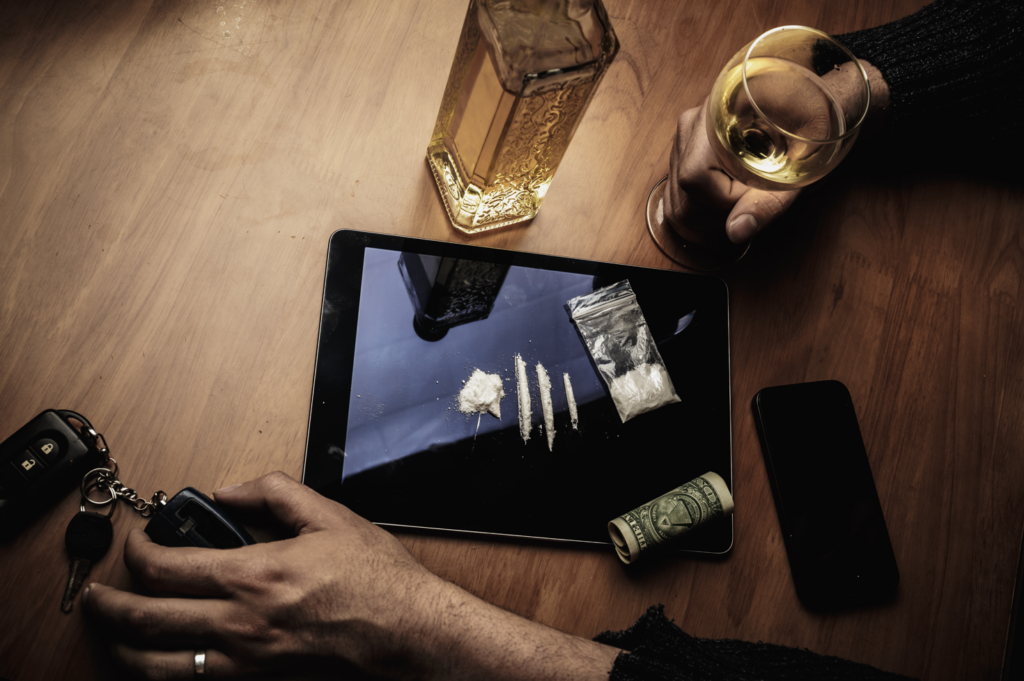You may know someone who ordinarily doesn’t touch cocaine most of the time, but when they drink—they find themselves craving it. That someone might even be you. Why do some people crave cocaine when they’ve been drinking? It turns out that medical science has an answer.
This Recover Colorado blog seeks to answer the question: Does alcohol help fuel cocaine addiction and why?
Why Drinking Alcohol Can Cause You to Crave Cocaine
The short answer is that cocaine and alcohol form a third compound in the body as they are metabolized. This third chemical is called cocaethylene. Cocaethylene is more addictive than either alcohol or cocaine alone.
People have been aware of a casual connection between alcohol and cocaine addiction for many years. But, no one knew if there was a medical or scientific explanation until research done in the late 1970s discovered the existence of cocaethylene and the role it played.
Once a person has experienced a cocaethylene high, they may feel driven to seek it out again. After they’re already drinking, their inhibitions are also lowered—making it more likely they will use cocaine given the chance.
This dynamic can help fuel a spiral into both alcoholism and cocaine addiction over time.
4 Reasons Why You Crave Cocaine When You’re Drunk
- Cocaethylene Formation: Alcohol and cocaine combine to produce cocaethylene, a potent, addictive compound.
- Counteracting Alcohol Sedation: It helps offset alcohol’s depressant effects so users can stay awake and drink more.
- Lowered Inhibitions: Alcohol reduces inhibitions, prompting even non-users to try cocaine.
- Cocaine is Addictive: Cocaine is addictive and cocaethylene is even more addictive.
The Alcohol and Cocaine Addiction Cycle
You or someone you know may seem to maintain control during the week, avoiding excess alcohol consumption and cocaine altogether. Perhaps they don’t even drink to excess every weekend. But, put that person at a wedding, New Years Eve party or another event where they drink to the point of intoxication and the math changes.
Sooner or later, a quest to find and use cocaine becomes a fixation. Once cocaine enters the picture, they may drink even more and behave in ways they wouldn’t usually. You’ll note that this never seems to happen with someone who’s never used cocaine and alcohol together before. That’s the cocaethylene connection and it’s what sets off this cycle of addictive behavior.
Does Alcohol Encourage Cocaine Use and Cocaine Addiction?
Yes and no. Just because a person drinks does not mean they’re going to spontaneously crave cocaine. Alcohol and cocaine have nothing to do with one another, aside from both being intoxicants. It’s when they are combined in the body and metabolized that the connection occurs—-both chemically and psychologically.
Once a person has experienced a cocaethylene high and their mind has made the connection between the two drugs, the seed is planted. Cocaethylene, the compound the body creates as it metabolizes cocaine and alcohol together is the biggest reason for this cocaine craving when you drink.
Cocaethylene has a powerful euphoric effect and is more addictive than either alcohol or cocaine are by themselves. Unfortunately, cocaethylene is also toxic and very dangerous.
Why Mixing Alcohol and Cocaine is So Dangerous
Combining alcohol and cocaine creates cocaethylene, a compound that’s more addictive and toxic to the heart, brain, and liver than either substance alone. Also, cocaine masks alcohol’s depressant effects, diminishing your awareness of intoxication and increasing the risk of alcohol poisoning or overdose.
Here are some of the serious risks associated with using alcohol and cocaine together:
Alcohol Overdose Risk:
Cocaine offsets alcohol’s depressant effects, reducing drowsiness and masking intoxication. This situation often leads to drinking more than intended, upping the risk of alcohol poisoning and overdose.
Risk-Taking Behaviors:
Both substances can spike risk-taking behaviors and aggression. When combined, they increase the likelihood of violence, drunk driving, and other dangerous behaviors that may result in serious injury or death.
Heart Risks:
Cocaethylene, produced when alcohol and cocaine are metabolized together, is highly addictive and cardiotoxic. It damages heart tissue, raises blood pressure, and greatly increases the risks of heart attack and stroke.
Brain Damage:
Alcohol and cocaine each cause neurological harm, but cocaethylene is even more toxic. It lingers in the body longer, inflicting more severe damage on the brain and nervous system.
Liver Damage:
Alcohol strains the liver, and although cocaine alone is less harsh, their combination produces highly hepatotoxic cocaethylene, which can lead to premature liver failure.
Recover Colorado: Addiction Recovery Begins With Action!
We hope you found this article helpful and informative. If you have any questions about alcohol and cocaine addiction, or addiction treatment in Colorado—please don’t hesitate to reach out to us.
Remember that the best of intentions simply isn’t enough. It takes ACTION for you or your loved one to overcome their addiction. Recovery Colorado is here to help.
Conveniently located in the Denver Metro Area, we are one of Colorado’s most trusted drug and alcohol rehabs. We accept most major health insurance plans, including Colorado Medicaid.
There’s no time like the present to start moving in the right direction.
Don’t wait. Call now: (888) 695-5407

